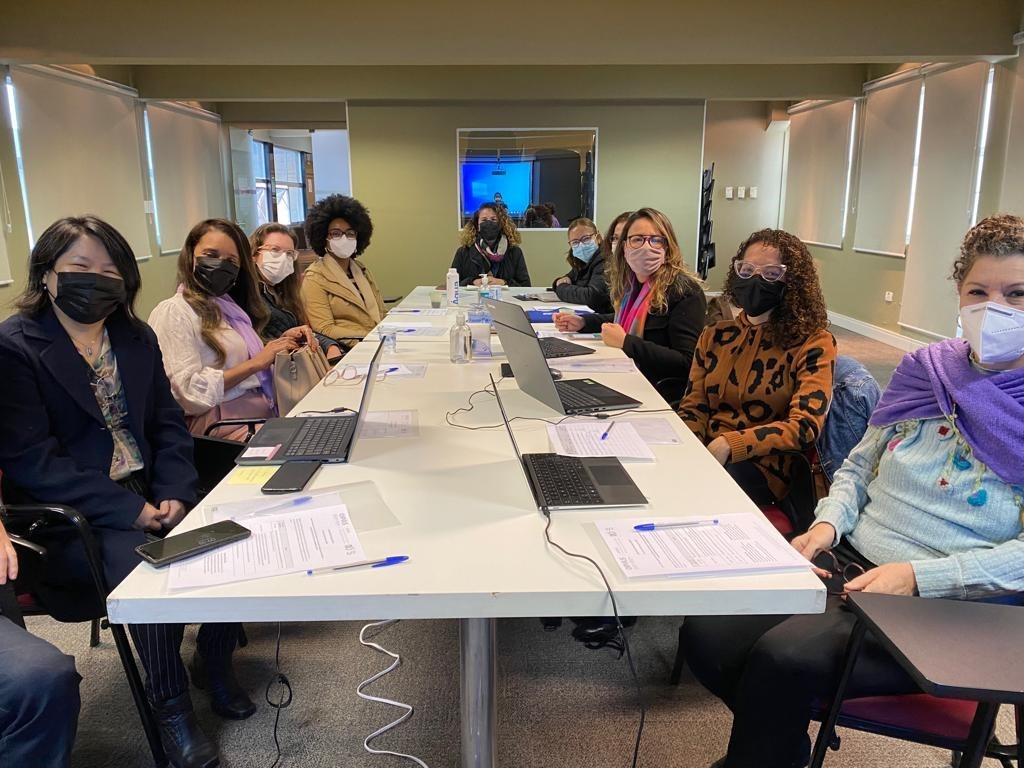The teams from BIREME and the General Coordination of Evidence of the Department of Science and Technology (COEVI/DECIT) of the Ministry of Health of Brazil met in person at the Center’s facilities on August 30 for an assessment of the technical cooperation developed in the last two years. The meeting also sought to identify subsidies for the establishment of a new cooperation project that will continue to contribute to increasing the production, use of, and access to scientific evidence in decision-making and policy-making processes in the context of the SUS, in line with the initiative Evidence-Informed Policy Network (EVIPNet) in Brazil.
The continuity of cooperation is justified by the historical gap that exists between the available scientific knowledge and the adoption of this knowledge by health systems and services at all levels, as well as the barriers that make it difficult to change this reality, such as:
- Scientific evidence is not properly valued as a subsidy by managers and competes with other factors that influence the decision-making process in health (social and political pressures);
- The mismatch between management time and science time means that evidence is not always available when decision makers need it; and
- Research results are not effectively communicated and, when they are, managers do not understand scientific language and/or have difficulty using it.
To change this scenario, it is still necessary to create mechanisms that facilitate and promote the production, access, and use of evidence in health decision-making processes, as proposed by the EVIPNet initiative and as explained among the objectives and guidelines of DECIT, such as, the institutionalization of the use of scientific knowledge in decision-making processes within the SUS.
In fact, there is a strategic alignment of the actions and interests of BIREME and DECIT in favor of creating mechanisms and actions that contribute to establishing a culture of using scientific knowledge in the scope of health management.
 Through technical cooperation, especially within the scope of the cooperation project with DECIT (in force between 2021 and 2022), BIREME has promoted the development of knowledge translation products and services that help to reduce the gap between research and practice (“know-do-gap”), with special services for search, analysis, synthesis and application of scientific knowledge in health decisions.
Through technical cooperation, especially within the scope of the cooperation project with DECIT (in force between 2021 and 2022), BIREME has promoted the development of knowledge translation products and services that help to reduce the gap between research and practice (“know-do-gap”), with special services for search, analysis, synthesis and application of scientific knowledge in health decisions.
Assessment of cooperation goals between BIREME and DECIT
Virtually all the goals of the two-year cooperation project, which will be completed in October 2022, have been achieved:
– Collaborative scientific evidence search service established for the DECIT and EVIPNet Brasil Network teams.
– Products and materials promoted and/or produced by DECIT, related to Knowledge Translation, registered in the PIE (Policies Informed by Evidence) database.
– EVIPNet Brasil (Portuguese) portal restructured and available for access.
– Production and publication of 2 Evidence Maps on topics of interest to the SUS: Post-Acute COVID-19 Sequelae (Portuguese) and Health Policy Assessment.
– Production and publication of 2 Windows of Knowledge: Natural History of COVID-19 (Portuguese) and Evidence-Informed Policy.
One goal that was partially achieved was the production of the course on the search for evidence-informed policies, which had its content developed, but not yet applied, to a distance learning platform. In agreement between the teams, the pending activities for the production and publication of the advanced course will be included in a new cooperation project, which is in the initial planning phase.
Renewal of BIREME and DECIT cooperation
The meeting between the teams of COEVI/DECIT and BIREME was very motivating and opened up many possibilities for expanding and strengthening this cooperation of more than 20 years.
It is worth noting that EVIPNet is an initiative launched by the WHO in 2005 with the main objective of establishing mechanisms to facilitate the appropriate use of scientific evidence in the development and implementation of health policies, providing an exchange between managers, researchers, and representatives of civil society. In 2007, PAHO made the EVIPNet call-up for Latin American and Caribbean (LA&C) countries and, in 2009, Brazil responded to the call, with DECIT as the coordinator of EVIPNet in the country.
Veronica Abdala, manager of information services and products at BIREME/PAHO/WHO, highlights the relevant participation and collaboration of the Evidence Centers (in Portuguese, Núcleos de Evidências) to achieve the technical cooperation objectives between BIREME and DECIT.
The BIREME team expects to strengthen cooperation ties and expand the exchange of experiences, knowledge, and ideas so that knowledge translation initiatives, products, and services are institutionalized in LA&C health systems.